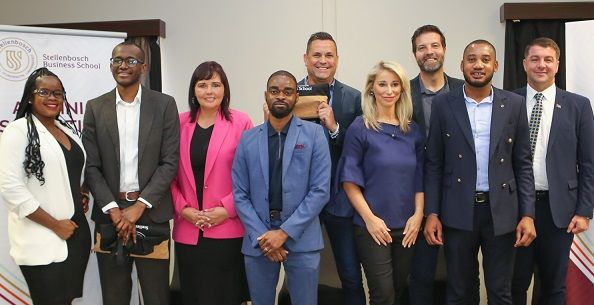
What does innovation hold for the future of Namibia’s economy?

Value creation through innovation and its possible impact on the local economy was the focus of a panel discussion between Dr Jako Volschenk of the Stellenbosch Business School, and the institution’s Namibian alumni.
The Stellenbosch Business School’s Namibia Alumni breakfast and networking event, facilitated by Denille Roostee, shared some valuable insights on strategies to boost a culture of innovation. The discussion was anchored by Dr Volschenk, the business school’s programme head of its highly rated MBA degree.
The panelist included Mignon du Preez, Executive Marketing Public Affairs and Sustainability at Old Mutual, Dino Ballotti, Executive Director MSME Development, Innovation, and Acceleration at NIPDB, Nawa Likando, Digital Strategy, Transformation and Innovation at MTC, Armin Wieland, Founder and MD of V5 Digital, and Jesaya Hano-Oshike, Head of Business Development of StartUp Namibia.
Creating a culture of innovation:
The discussion opened with the need for developing a culture of innovation at workplaces, schools, and universities across Namibia where people feel encouraged to innovate. The panel agrees that most modern businesses lack a risk appetite, which is why innovation must be presented as something enjoyable and beneficial to employees.
Du Preez mentioned, according to studies, that 90% of executives value innovation, and as many as 50% of companies have an innovation plan in place. Since millennials now have a far better idea of what it takes to run a sustainable business, another set of numbers shows that 44% of Gen Zs make their employment decisions primarily on the ethics of a company. The calibre of a company’s clientele and its ability to turn a profit are major factors in this regard.
Fear of failure as barriers to innovation:
When addressing the fear of failure as a significant barrier hampering a culture of innovation, the panel noted that it could be overcome with appropriate recognition, as innovation is a creation of new combinations of existing resources, which are often disruptive. The panel also talked about the successful introduction of new services, products, processes, business models, ways of working and the need for a continuous and dynamic process in which ideas are transformed into value.
The value of smart partnerships:
The tendency to operate in silos rather than adopt a systems-thinking stance was cited by Likando as another challenge Namibians confront when it comes to innovation in general. He then suggested inviting outside perspectives into your company as a means of fixing the problem. Likando made reference to the recently opened MTC Innovation Centre, the purpose of which is to provide a forum in which business leaders can discuss common problems and brainstorm ways to increase mutual benefit through cooperation.
Inclusion and diversity as drivers of innovation:
Roostee stressed the value of inclusivity and diversity as inspiration for new ideas, echoing Likando’s statement on the importance of infusing innovation throughout the organization, across all departments. “It has been proven scientifically that companies with more diverse and inclusive workforces are more likely to come up with innovative solutions to customer pain points” Roostee said. To back up her claim, she referred to research conducted by Stefanie K. Johnson, a professor of management at Colorado University who found that teams with greater demographic variety made better decisions overall, but that teams with the highest levels of diversity and inclusion were the most successful. Decision-making outcomes improved by as much as 60% when teams prioritised diversity and inclusion.
In closing, the panel hoped that the conversation would be pushed to a national level to develop a culture of innovation allowing more public and private firms to deliver value to their clients and the general population, so positively contributing to the Namibian economy.

From the left, Mekupi Kambatuku, Jesaya Hano-Oshike, Mignon du Preez, Nawa Likando, Armin Wieland, Denille Roostee, Dr Jako Volschenk, Petrus Hamukwaya and Dino Balotti.











































